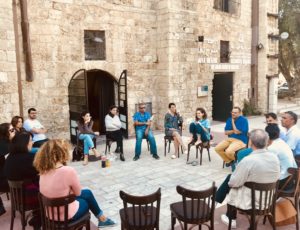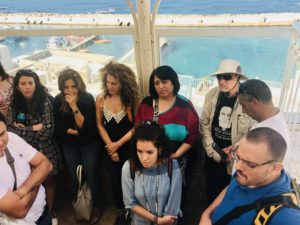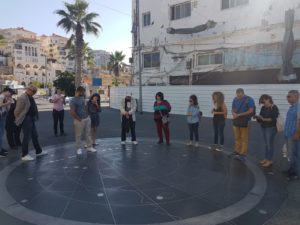Intensive Day in Jaffa for Mixed Cities Course
 On November 10, our Leader for Change in Mixed Cities embarked on an intensive tour in Jaffa, organized by the group’s Jaffa residents. The tours are organized by the participants who live in mixed cities for two main reasons. The first, it gives them the opportunity to examine the various activities going on in their own city and decide what will interest the group. Second, planning the tour serves as preparation for projects they will plan together at the end of the course.
On November 10, our Leader for Change in Mixed Cities embarked on an intensive tour in Jaffa, organized by the group’s Jaffa residents. The tours are organized by the participants who live in mixed cities for two main reasons. The first, it gives them the opportunity to examine the various activities going on in their own city and decide what will interest the group. Second, planning the tour serves as preparation for projects they will plan together at the end of the course.
This time the participants decided to step off the usual path of the historic tours and instead focused on the current struggles in the city.The tour started near the Jaffa Clock Tower where Ibrahim Agbaria, co-facilitator of this program, told his story of moving to Jaffa during the First Intifada. Ibrahim spoke about the process of constructing his Jaffa identity, where he felt he was only residing there temporarily, even after marrying and having children. It was only after he become involved socially and politically in the city that he started to feel part of it.
After hearing his story, the group was guided on a tour by Abed Abu Shehadeh, a social activist and member of the Jaffa Muslim Committee. The tour focused on the Waqf’s struggle in recent years to rediscover and retrieve pre-1948 Waqf property, property that is mostly managed in secret by the State. In addition, he also spoke about the housing issues in Jaffa and the effects of gentrification on some of the neighborhoods in the city. The tour ended in Jaffa’s ancient port, where we were introduced to the fishermen’s fight to remain in the port where they were pushed to one dock and are now under threat of having it closed.
After the tour, the group gathered at the Saraya building which is home to the Saraya theater and to the Local Theater organization. Mahmoud Abu Arisheh, director of Al-Saraya Theater, presented the story of the building and the different theaters it houses.
 Anat Verbin, a participant in the course, spoke about her work as a director of a community center in a mixed neighborhood in the city. Afterwards, Ami Katz, Director of the Mishlama, a municipality framework working to develop Jaffa, presented their work and important projects. Among their work is a project to encourage tourism in Jaffa and construction of affordable housing. Finally, Eyal Raviv, another participant, spoke about the parents’ struggle to open a bi-national school in Jaffa. From his talk the participants concluded that a small but determined group of parents can move a larger group and create influence on the city-wide level.
Anat Verbin, a participant in the course, spoke about her work as a director of a community center in a mixed neighborhood in the city. Afterwards, Ami Katz, Director of the Mishlama, a municipality framework working to develop Jaffa, presented their work and important projects. Among their work is a project to encourage tourism in Jaffa and construction of affordable housing. Finally, Eyal Raviv, another participant, spoke about the parents’ struggle to open a bi-national school in Jaffa. From his talk the participants concluded that a small but determined group of parents can move a larger group and create influence on the city-wide level.
One of the participants summarized the tour: “It was an important, meaningful, and fun tour. We had the opportunity to hear about the historic Arab side of the city in the tour in Old Jaffa, but also about the current city by learning about the Mishlama’s work. The tour also gave the group the opportunity to connect, breath sea air, din together, and discuss the future!”
The School for Peace is holding the Leader for Change in Mixed Cities in Israel course for the third time. We envision leaders whose view of solving problems is not based on militaristic views, but on ideas of peace, negotiations, social justice, and shared life. This program connects between key actors, Jews and Palestinians, in mixed cities in Israel, who see themselves among the city’s leadership in both the near and the far future, for dialogue that promotes action for change. Together, the participants will initiate implementable projects and actions in the field, in their own mixed cities.
Author: Roi Silberberg, co-facilitator in the program and project director at the School for Peace.
